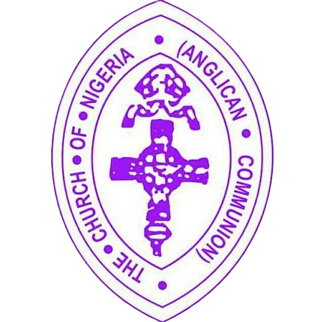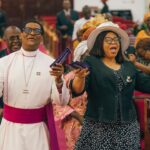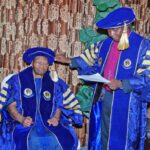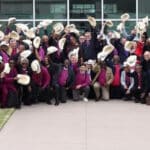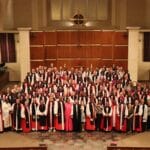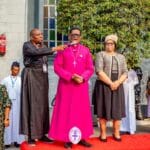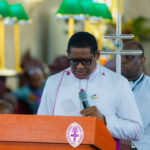- Adesewa Orioye
- August 13, 2024
- 0 Comments
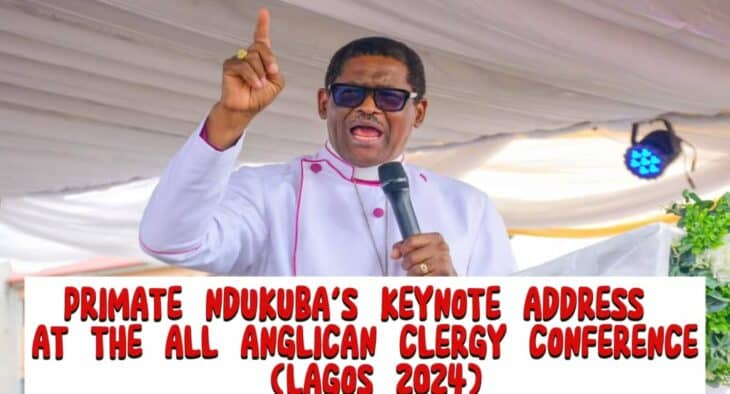
OFFICIAL OPENING ADDRESS BY HIS GRACE, THE MOST REV’D DR. HENRY C. NDUKUBA,THE PRIMATE OF ALL NIGERIA AT THE 2024 ALL ANGLICAN CLERGY CONFERENCE HELD IN LAGOS FROM 5TH TO 8TH, AUGUST, 2024.
THEME: MAINTAINING ANGLICAN HERITAGE AND IDENTITY IN TIMES LIKE THIS (2 Tim.: 3:14-17)
GAFCON COLLECT:
Eternal God and Gracious Father, Whose Son Jesus Christ died for our redemption; commissioned His disciples to preach the Good News; and sent the indwelling Holy Spirit in every generation to embrace and proclaim salvation in Christ alone: Arise and defend your Church, the pillar and bulwark of the Truth. Shine the Light of Your Holy Word upon hearts darkened by error and strengthen the work of GAFCON so that the Anglican Communion throughout the world proclaims Christ faithfully to the nations, that captives may be set free, the straying rescued, and the confused restored. Bind Your children together in truth, love, unity, and courage, that we, with all your saints, may inherit your Eternal Kingdom, through our LORD and Saviour Jesus Christ. Amen.
Protocol:
Preamble:
It is with Jesus’ joy that I welcome you all to this All Anglican Clergy Conference 2024! This Conference is held every four years and has remained a place of renewal and fellowship for our Clergy. We are profoundly grateful to God for His awesome work in His Church through our clergy. We are immensely thankful to the LORD for making this year’s conference a reality. We appreciate the Most Rev. Blessing C. Enyindah, the Dean of the Church of Nigeria and Bishop of Ikwerre Diocese along with the entire Conference Planning Committee. We are grateful to the Archbishop of Lagos Province, the Most Revd. Dr. Michael Fape and the entire Bishops of the Dioceses in the Province of Lagos. We thank the Bishop, Clergy, and laity of Lagos, Lagoswest, and Lagos Mainland Diocese for your excellent preparation in hosting this Clergy Conference and your generosity in caring for us. We appreciate all our Archbishops and Bishops in the Church of Nigeria for encouraging and mobilizing our Clergy to attend this Conference.
Our prayer is that these few days will be days of personal divine encounter- “Mount Peniel” (Gen.32:30) like Jacob you shall all return to your stations and parishes a transformed and renewed servant of God in Jesus Christ’s name. May God’s abiding Presence be with you and may you receive grace to go with the Lord into the great future He has prepared for you all, even if the giants of these times are on your way, God has already given you victory. Amen.
Our theme – Maintaining Anglican Heritage and Identity in a Time like This:
In a world characterized by rapid change, uncertainty, and moral ambiguity, it is often challenging to find a stable foundation upon which to build our lives. As we navigate these perilous times, the Bible remains a timeless source of comfort, guidance and strength. 2 Timothy 3:14-17, where the Apostle Paul offer profound counsel to his disciple, Timothy. This counsel provides valuable insights into how we can remain steadfast in our faith and equipped for good works amidst life’s challenges.
Consistent Christian Living:
In a time akin to ours, Paul urged Timothy to “continue in what you have learned and have become convinced of.” This counsel is especially relevant today as we are bombarded with a plethora of ideologies and opinions. In such a cacophony, it is easy to lose sight of the foundational truths that have shaped our beliefs and values. We are reminded of the importance of anchoring our lives in the unchanging word of God and the teachings of the scriptures that have proven to be true and reliable. These teachings serve as our moral compass, guiding us through the complexities of modern life. As clergy we have this sacred trust to remain consistent in our walk with the Lord and our consistent teaching of the Word of God. The significance of the Holy Scriptures to our lives and ministry as Clergy is underscored by its being “God-breathed.” This fact in itself should be an adequate reason for proclaiming it. It does not merely contain the Word of God, construct of men, or become the Word of God under certain conditions. It is God’s Word, the expression of His Person (heart, mind, and will). Therefore it has divine authority.
The Word of God is Powerful and Relevant:
The Word of God is uniquely powerful and relevant across generations even in times of uncertainty and moral confusion as we are today.
Hebrews 4:12 says, “For the word of God is quick, and powerful, and sharper than any two-edged sword, piercing even to the dividing asunder of soul and spirit, and of the joints and marrow, and is a discerner of the thoughts and intents of the heart”.
I therefore charge you all, clergy of our Church to focus on teaching and preaching the sound Word of God. This is essential for the spiritual growth and development of God’s people. We cannot play lip service to these essentials of our ministry.
Prioritize Sound Teaching of God’s Word:
We must be intentional about prioritizing the Teaching of God’s Word because it builds God’s character, and provides a comprehensive framework for understanding the world and our place in it. The Scriptures serve as a mirror, revealing our faults and shortcomings. It is important to embrace and rebuke in love as clergy. We should avoid a situation where a clergy rebuffs rebuke, remains unteachable and will not take correction and at the slightest discipline lobbies to go to another Diocese is not acceptable. We must abhor sin and seek repentance and transformation. God’s means of training His servant in righteousness, and shaping our character, conduct, and lifestyle is the Holy Scripture. Our regular engagement with the Bible, first for our own lives not just for sermon preparation, will develop in us virtues and habits necessary for a godly life. As we face the uncertainties and complexities of our time, let us hold fast to the wisdom of Scripture, finding in it the guidance and strength to live faithfully and purposefully
Living by conviction:
Timothy’s conduct grew out of what he had “learned” and “become convinced of.” More than ever before the 21st century believers and pastors must be resolute, authentic, and steadfast in their beliefs and values. It is being said that a man who stands for nothing will fall for anything, my beloved Clergy- Stand for God and His Word. Living by conviction is intrinsically tied to your faith in Christ, personal salvation experience, and the teachings of the Bible. We must have a firm belief in the truths of God’s Word, a deep-seated assurance, and dedication to live in alignment with God’s will, coupled with a commitment to act on these beliefs. Our conviction will be tested by lust for money, power, and the prevalence of evil. Do not give up your conviction even in the face of death. Our conviction must be unwavering in the Face of Adversity: I believe the story and life of the four Hebrew young men Daniel, Shedrack, Meshack, and Abednego in the land of Babylonian should inspire us to stand for God. (Daniel 1:8,3:16-18). There is so much moral decadence in our World today, including the ordained servants of God, the love of many have become dead-cold. As Clergy we must have moral conviction to resist societal pressures. Romans 12:2 says, “Do not conform to the pattern of this world, but be transformed by the renewing of your mind. Then you will be able to test and approve what God’s will is—his good, pleasing, and perfect will.”
In these last days, living by conviction requires a personal deep, unwavering commitment to the truths of the Bible and a willingness to act on those truths, regardless of circumstances. It involves integrity, compassion, justice, and a reliance on the Holy Spirit for guidance and strength. As we live out our convictions, we must be willing to suffer for our convictions. When we live by conviction we do not only honor God but also provide a powerful testimony to the world of the transformative power of our faith in Christ. Do not join others in evil, remember you will give account for your life before God.
Our Anglican heritage and Identity:
The Anglican Church denomination is part of the One, Holy, Catholic, and Apostolic Church worshipping one God, Father, Son, and Holy Spirit. We are part of the Body of Christ, bound together and guided by “One Lord. One Faith, One Baptism” (Ephesians 4:5). The Church is the ‘New Israel’, called unto being and on a Rescue Mission to save humanity from the eternal consequences of the Fall of Adam to sin; hence, propelled by the worldwide Commission by Our Lord to “Go into all nations of the world and preach the gospel, teaching and baptizing them in the name of the Father, the Son and the Holy Spirit (Mathew 28:19-20), the Church, as Light and Salt must not conform to sinful lifestyle or culture but confront them through the power of the Gospel.
The Church of Nigeria (Anglican Communion) was planted through the missionary response and efforts of the Church Missionary Society (CMS) of England in 1842 and became an autonomous Province in February 24, 1979, ours is an Evangelical Anglican heritage and Identity.
The Anglican Evangelical tradition, rooted in the Reformation and characterized by a commitment to the authority of Scripture and the proclamation of the Gospel, has played a pivotal role in shaping the Anglican Communion. As contemporary society evolves, maintaining this heritage and identity requires a careful balance of fidelity to historical doctrines and responsiveness to current challenges.
The Anglican tradition emerged from the Reformation, emphasizing the authority of Scripture, justification by faith, and the necessity of personal conversion. Church Fathers like Thomas Cranmer, the first Protestant Archbishop of Canterbury, crafted the Book of Common Prayer and the Thirty-Nine Articles of Religion, which remain foundational texts. These documents reflect core Evangelical principles: the supremacy of Scripture (Sola Scriptura), salvation by grace through faith (Sola Fide), and the centrality of Christ’s atoning sacrifice. Central to this heritage is a robust commitment to evangelism and mission. This missionary spirit led to the establishment of societies like the Church Missionary Society, which expanded Anglican Evangelical influence globally. The contemporary Anglican identity, though Anglo-Saxon is simply symbolic has no tie to the English people nor their cultural tendencies. The Church of England stands as a Historic Mother Church, whilst it remained a Church faithful to its basic tenets and spiritual formularies.
Most of you are no strangers to the revisionist agenda of the Western Churches that has eaten into the very fabric of the Anglican Church. They opposed the fundamentals of the Christian faith and Anglican orthodoxy with the ungodly approval and practice of Same-sex Marriage, contrary to Lambeth Conference resolution 1:10 of 1998, and their racial arrogance to ignore the voice of the larger population of global Anglicans within the Church mainly situated in the Global South! This necessitated the establishment of the Global Anglican Future Conference (GAFCON) in 2008 as a safe Harbor for the Faithful by its rescue mission articulated in the Jerusalem Statement. All our Clergy need to understand the firm stand of the Church of Nigeria, on this matter, GAFCON is part of our effort to maintain our Anglican Heritage and identity, and that is why we prayed the GAFCON Collect.
Maintaining this heritage in the modern world is not without challenges. One significant threat is the increasing secularization of the society and postmodern worldview which often marginalizes orthodox Christian faith and undermines traditional Christian values. As secular ideologies gain prominence through coercion, promotion, and threat by the Western world, there is a risk of yielding to this pressure or falling into the trap and bait of financial gain- we must continue to resist this evil.
Strategies for Maintaining our Anglican Heritage and Identity:
First, we must emphasize Scriptural Authority: A renewed commitment to the authority of the Scripture is paramount. This involves rigorous biblical teaching and preaching, equipping congregations to engage deeply with the Word of God. Dioceses must prioritize theological education and training for clergy and laity alike, fostering a robust understanding of Evangelical doctrine and its application to contemporary issues.
Secondly, Fostering Evangelism and Mission: Our Evangelical heritage is intrinsically missional. All our Churches should actively engage in evangelistic outreach, both locally and globally. This can involve community engagement, social justice initiatives, and cross-cultural mission work. We must bear witness to the transformative power of Christ in all our communities. It is for this reason we are strengthening our Missions strategy in the Church of Nigeria with the appointment of some of our Bishops as Episcopal Mission Coordinators for each Province. Immediately after this Conference, we shall be holding a national Mission consultation here in Lagos that will involve all our Diocesan Director of Missions.
Thirdly, we shall continue to Encourage Theological Dialogue and Engagement: Our theological seminaries shall continue to be supported and the Theological Consultation will be sustained to foster theological dialogue that will help to maintain our Evangelical distinctives. We must be encouraged to engage in continuous theological education, a case where a senior clergy with a Diploma certificate remains comfortable in parish ministry should be discouraged. You must endeavor to keep improving yourself and your wives.
Fourthly, Engaging with Contemporary Cultural Issues: As servants of God, ordained into Holy orders, you must fulfill your prophetic and priestly calling by confronting the revival of idolatry in our communities. We must be deliberate about this through the teaching of God’s word, evangelism, and intense intercession. As Anglicans we must also engage thoughtfully with contemporary culture, particularly among our young people. This involves addressing current contemporary issues through the lens of Scripture, offering a compelling Christian perspective on topics such as ethics of Artificial Intelligence, social justice, environmental stewardship, and human sexuality. We must demonstrate the relevance of the Gospel in this modern world and for all generation.
Conclusion
Maintaining the Anglican heritage and identity in a time like this is a clarion call to all, that is vital to our calling as ordained clergy. It requires a steadfast commitment to Scriptural authority, doctrinal fidelity, and a missional ethos. You must emphasize biblical teaching, godly lifestyle, upholding historic creeds, fostering evangelism, missions and intentional discipleship. We must preserve our Evangelical heritage for future generations. The Psalmist said, “A posterity shall serve Him. It will be recounted of the Lord to the next generation…” (Psalm 22.30). We must continue to proclaim the transformative power of the Gospel, bearing witness to the enduring truth and power of Jesus Christ, even unto the next generation.
God bless you all.
MARANATHAN! PEACE BE WITH YOU ALL!
The Most Rev’d Dr. Henry C. Ndukuba, MA BD, MA (Ed.), DD
Archbishop, Metropolitan and Primate of All Nigeria.
